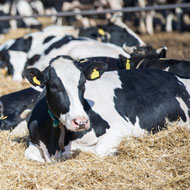
Group will deliver objectives through ‘Targets Task Force’ initiative
A new dairy stewardship group has been launched to deliver on a range of antibiotic targets due to be announced later this year.
Bringing together farming, veterinary, processing and support functions, the Dairy Antimicrobial Stewardship Group aims to identify the responsibilities and actions required of different organisations to achieve the targets and monitor progress.
The group will develop its objectives through the 'Targets Task Force’ initiative, which was set up by RUMA to meet the government’s target for farm antibiotic use of 50mg/kg by 2018.
The 'Targets Task Force' aims to identify meaningful objectives for reducing, refining and replacing antibiotic use at farm level, with targets due to be announced at the RUMA conference on October 27.
The dairy group, chaired by Di Wastenage, Devon dairy farmer and council member for the Royal Association of British Dairy Farmers (RABDF), will feed back its progress to RUMA as work progresses.
“Antibiotic use is of growing importance given concerns over antibiotic resistance. The formation of the group is important to deliver the strategy and will ensure the dairy sector is well-placed to reach its targets,” said Mrs Wastenage.
“Reducing the use of antibiotics must not compromise the health and welfare of dairy cows either, which is why a responsible approach to this challenge is needed.The strategy will also be an opportunity to improve the health and welfare of the dairy herd, and to raise productivity.”
She adds that special training for vets and farmers will be key to achieving the group’s goals, equipping both professions to join forces on responsible use.
“I’d like to thank all the organisations that have committed to participate in the group. The broad level of representation shows how important the issue is to the industry and I look forward to working with them over the next few years,” Mrs Wastenage adds.
The Dairy Antimicrobial Stewardship Group consists of: AHDB, Arla Foods, British Cattle Veterinary Association, Dairy UK, Lactalis, Livestock Auctioneers Association, National Milk Records, National Office for Animal Health, RABDF, Red Tractor, RUMA and the UK farming unions – National Farmers Union of Scotland, Farmers Union of Wales, NFU England and Wales, Ulster Farmers Union.



 The veterinary mental health charity Vetlife is inviting the veterinary community to join it for a sponsored cold-water dip.
The veterinary mental health charity Vetlife is inviting the veterinary community to join it for a sponsored cold-water dip.